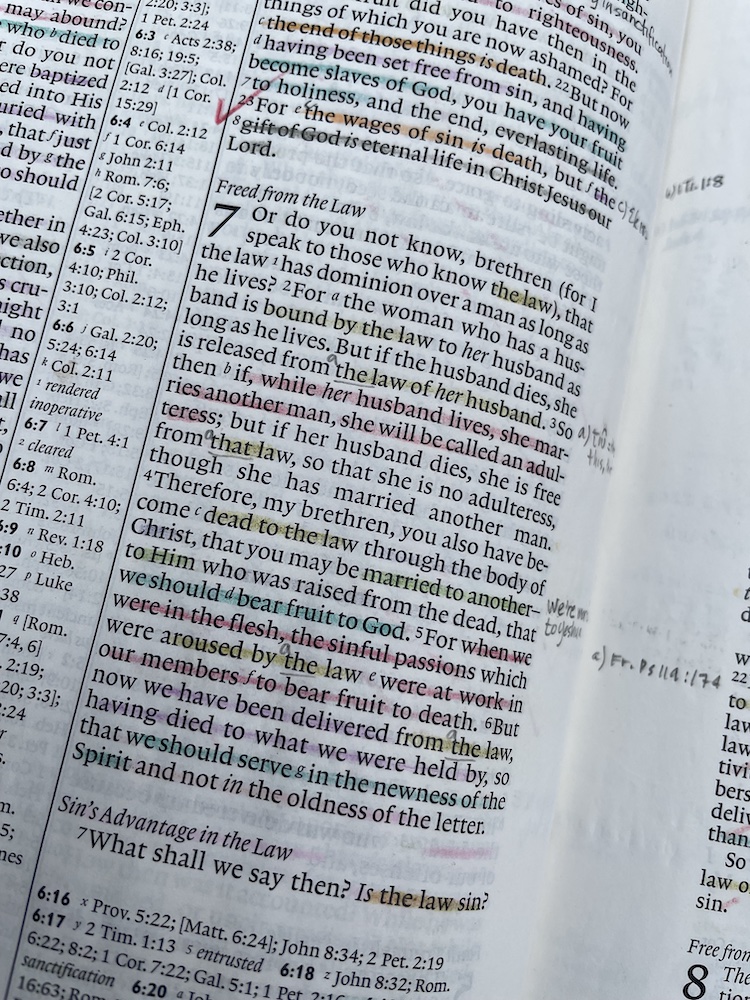Category Archives: Gospel Message/Salvation
Shemini Azteret & Eternity as a Glorified Child of Elohim
Let’s Celebrate the Feast of Tabernacles!
Deuteronomy 24 Ki Tetze on the “Freed from the Law” Church Lie
In this video, we explore Paul’s rather cryptic discussion in Romans 7:1–6 of being freed from the law of a wife’s husband and how it does not mean what the mainstream church has taught for nearly 1,900 years. Rather “the law of her husband” relates back to Deuteronomy 24:1–4 where Paul ties this into the deeper meaning of Yeshua’s death on the cross and the saints’ spiritual marriage to him. This amazing truth behind the traditional message of the gospel will not only deepen your understanding and appreciation of the cross and the gospel message, but your love for Yeshua as well, along with the rich, interweaving of BibleTruth as it relates to YHVH’s plan of salvation. Prepare to be enlightened, amazed and edified all at the same time!
You can find a written study guide for this teaching at https://hoshanarabbah.org/blog/2022/09/03/the-divorce-and-remarriage-of-yhvh-the-son-and-the-deeper-meaning-of-the-gospel-message/.
The Divorce and Remarriage of YHVH the Son and the Deeper Meaning of the Gospel Message

After you read this article, I hope you will come away amazed saying, “Wow! I never knew this before….” May your love for the gospel message that you have heard since you were young be deepened and broadened, and may your childlike awe and wonder for YHVH’s plan of salvation for lost sinner, like you and me, come to a whole new level, and may your love for Yeshua the Messiah, our Master and King, and soon coming Bridegroom, soar into the stratosphere.
The purpose of my blog is to stir up the people of YHVH and their love for him, and hopefully spark a spiritual revival in each us that will spread like a wildfire far and wide for the glory of YHVH Elohim and the expansion of his kingdom. Amein.
Romans 7:1–6 —The Law of the Husband Explained

How many of us have read the first few verses of Romans chapter seven and assumed that somehow Paul is telling us that we are dead to the entire Torah-law—that we are no longer bound to it, that we no longer have to keep it? Is this what he is really saying? If so, does this mean that it’s now all right to violate the Torah’s prohibitions to steal, lie, murder, commit sexual sins, covet, worship idols, dishonor our parents, take YHVH’s name in vain and to have sex with animals? If not, then what is Paul really saying in this passage—one that is often used by many perhaps well-intended but misguided people in an attempt to prove that the Torah-law that YHVH Elohim gave to Moses and the children of Israel has been “done away with”?
To understand the truth of Romans 7:1–6 in its whole Bible context, let’s take a trip back into the Torah to understand what Paul is saying with regard to a specific law that has to do with the marriage covenant which he refers to here as “the law of her husband” (v. 2), and to which law a wife is dead (v. 4) if her husband dies, and then how this relates prophetically to Yeshua’s death on the cross and the saint. You about are to discover a deep truth pertaining to the gospel message that has been hidden in plain sight to most Christians for nearly two thousand years. This jaw-dropping revelation will expand your understanding of the gospel and Yeshua’s death on the cross and take it to a whole new level.
Here now is the specific law in the Torah to which Paul makes reference in Romans chapter seven. It is found in Deuteronomy 24:1–5 where we read,
1 When a man hath taken a wife, and married her, and it come to pass that she find no favor in his eyes, because he hath found some uncleanness in her [The Stone Edition Tanach: found in her a matter of immorality; found her offensive in some respect] then let him write her a bill of divorcement, and give it in her hand, and send her out of his house. 2 And when she is departed out of his house, she may go and be another man’s wife. 3 And if the latter husband hate her, and write her a bill of divorcement, and giveth it in her hand, and sendeth her out of his house; or if the latter husband die, which took her to be his wife; 4 Her former husband, which sent her away, may not take her again to be his wife, after that she is defiled; for that is abomination before YHVH: and thou shalt not cause the land to sin, which YHVH your Elohim giveth thee for an inheritance. [Emphasized sections are to be discussed.]
The word uncleanness or immorality is the Hebrew word ervah which according to The Theological Wordbook of the Old Testament refers simply to “nakedness or the resulting shame therefrom.” Strong’s Expanded Concordance adds to this definition the following meaning: “an indecent thing or figuratively the idea of disgrace or blemish”. According to Strong’s Concordance, this word is used in a various ways in the Tanakh (Old Testament) with reference to shameful sexual exposure or nudity as in the case of unlawful cohabitation (Lev 18:6), or the shame resulting from Israel’s spiritual adultery (Lam 1:8); or any “indecent thing” that represents defilement or uncleanness resulting from the misuse of the physical body (e.g., uncleanness [due to not burying human excrement] in the military camp, or violation of any laws of sexual abstinence, or being in a state of impurity from sexual cohabitation or nocturnal emissions). With regard to Deuteronomy 24:1 Strong’s comments, “ervah appears to bear this emphasis on any violation of the laws of purity—if a groom is dissatisfied with his bride ‘because he hath found some uncleanness in her,’ he may divorce her. Obviously this evidence is not of previous cohabitation, since such a sin merits death (Deut 22:13ff).”
The exact meaning of ervah is of great controversy between scholars. In his commentary on this passage, Jewish Torah scholar Samson Raphael Hirsch says nothing about the subject, although he goes into great detail about the peripheral issues relating to divorce and remarriage, the legalities concerning the bill of divorcement (Heb. get), etc., but not the cause of the divorce in the first place (i.e., the biblical meaning of unclean thing). Likewise, a cursory search of the Mishna (the second century written compilation of the Jewish Oral Law and precursor to the Talmud) on the subject reveals dozens of pages of minute details regarding divorce and remarriage and various attendant subjects, but I could find no legal definitions regarding the meaning of ervah or had how a marriage could be dissolved because a man found ervah (whatever that may be) in his wife. The meaning of this word and what were indeed grounds for a man to “put his wife away” was a controversy that raged in the first century between the two main Pharisee camps as well (i.e., the Schools of Hillel and Shammai). Even Yeshua weighed in on this controversial subject in Matthew 5:31–32 siding with the more conservative school of Shammai. The meaning of his exact words have fueled theological debates among Christian scholars to this day with regard to what constitutes legal grounds for divorce among believers.
In the simple or literal (Heb. pashat) meaning of this text ervah may or may not be specifically referring to the loss of the bride’s virginity prior to consummation of her marriage with her new husband, since Deuteronomy 24:1 neither specifically states, nor implies that this is the first marriage for both of them. This is underscored by the Torah’s use of the Hebrew word ishah (wife or woman) in verse one as opposed to either the words bethulah or almah both of which lexically have stronger references to a virgin, youthful bride or young maiden as opposed to the more generic term ishah. Therefore, based on the generic meaning of the word ervah (as discussed above) there could be broader meanings as to why the husband was compelled to “put his wife away” (e.g., as for adultery). If this is the case, do we find any example of this elsewhere in Scripture which could give us additional insight into the Hebraic understanding into the meaning of ervah?
Continue reading →D’varim—Moses & John Reveal the Heartbeat of Torah
For years, Deuteronomy (D’varim) has been one of my favorite books of the Bible for several reasons. Mostly because in it Moses reveals the heart of our loving Father in heaven for his people, and why it’s important for them to follow his ways, which are a river of life and a source of great blessings. Additionally, Deuteronomy is the aged Moses’s last will and testament for the people of Elohim, and it contains life saving information for the next generation. It also reveals the quintessential truths of YHVH’s Torah, while pointing people toward Yeshua the Messiah, who is the Living Torah-Word of Elohim. Interestingly, and I have sensed this for many years, John’s first epistle, written when he too was a very old man, is like the Deuteronomy of the New Testament containing much of the same information, warnings, pleas, instructions and exhortations as Moses’ last book. For the first time, in this video, I do a comparative analysis of the main messages of each of these books such that your perspective on each one may be expanded and a new appreciation for each as well as Messiah and his Torah gained. May you be blessed! — Nathan

